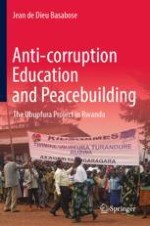2019 | OriginalPaper | Buchkapitel
6. The Rwandan Context
verfasst von : Jean de Dieu Basabose
Erschienen in: Anti-corruption Education and Peacebuilding
Aktivieren Sie unsere intelligente Suche, um passende Fachinhalte oder Patente zu finden.
Wählen Sie Textabschnitte aus um mit Künstlicher Intelligenz passenden Patente zu finden. powered by
Markieren Sie Textabschnitte, um KI-gestützt weitere passende Inhalte zu finden. powered by
